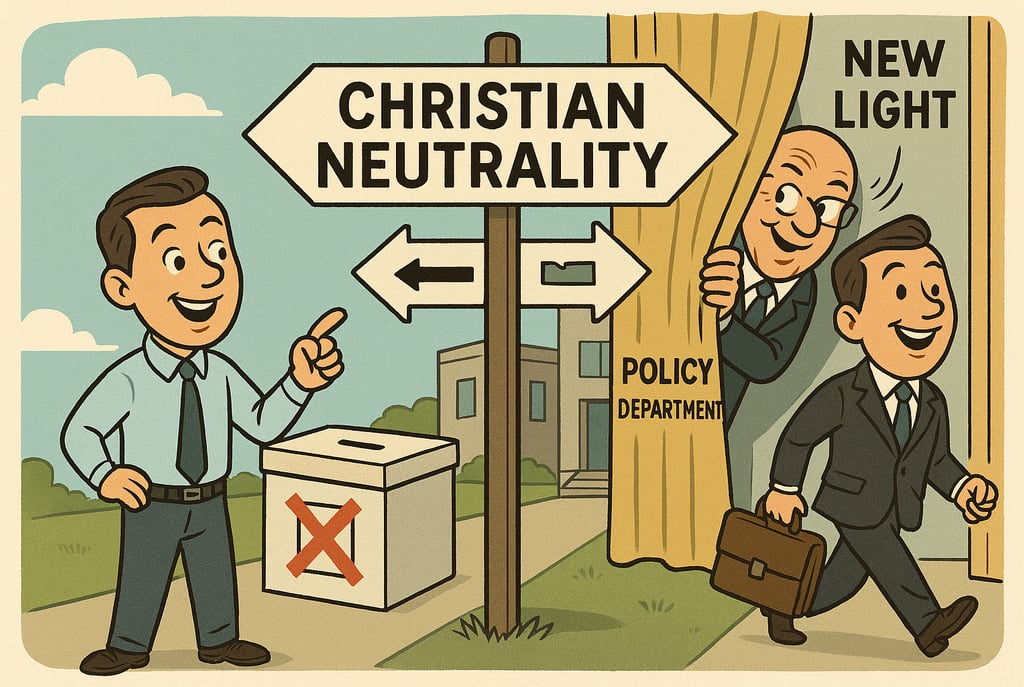Christian Neutrality™: The Watchtower’s Choose-Your-Own-Compromise
What does “Christian neutrality” really mean when you’re allowed to write government policy but not vote? In this satirical deep dive, we explore the flip-flopping interpretations behind the Jehovah’s Witnesses' neutrality doctrine — from Rutherford's power grab in 1929 to modern contradictions that still shape JW life today. With humor, history, and a touch of exasperated logic, this post asks: neutral… or just selectively involved?
TTATT
Oliver
4/14/20255 min read


“We remain politically neutral.”
— Every JW ever, just before handing you a Watchtower about why Satan controls your government.
A Badge of Honor… or a Cloak of Convenience?
If there’s one thing Jehovah’s Witnesses love to claim about themselves, it’s that they stay neutral. Not left, not right — not even center. Just spiritually floaty. Above it all. Neutral in war. Neutral in politics. Neutral in every election — even when the local school board is deciding whether to ban lunch.
They don’t vote. They don’t run for office. They don’t lobby. Well — they say they don’t lobby. But let’s just say, that’s… debatable. They don’t salute flags or sing anthems. Why? Because according to JW doctrine, all governments are part of Satan’s world, and a real Christian wouldn’t touch politics with a ten-foot shepherd's staff.
But here’s the thing…
That shiny badge of “neutrality” starts to look more like a spiritual smokescreen when you peek behind the curtain. The doctrine sounds simple — but its application? Arbitrary at best, wildly inconsistent at worst.
Romans 13:1–2: The Flip-Flopping Verse
This whole thing starts with a Bible verse — Romans 13:1–2, which says:
“Let every soul be in subjection to the superior authorities, for there is no authority except by God.” (NWT)
For decades, like most Christians, the Bible Students (early JWs) believed “superior authorities” meant human governments. Obey the law, pay your taxes, stay out of jail — all good.
Then came Rutherford. In 1929, he decided those “superior authorities” couldn’t possibly be human rulers. No way would Paul say governments are placed by God — that’s Satan’s turf! So instead, JWs started teaching the “superior authorities” were Jehovah and Jesus.
In his Higher Powers article series (The Watchtower, June 1 & 15, 1929), Rutherford reinterpreted Romans 13 to refer not to governments, but to “the Society” — i.e., himself. He applied Peter’s call to submit to kings and governors to church leaders, subtly placing himself in the role of spiritual king and governor over Jehovah’s Witnesses. He didn’t say it out loud, but it was clear enough. That shift gave him a divine blank check to rail against secular authorities at full volume.
“This new 'Higher Powers' doctrine provided Rutherford with free range to rail against secular authorities in the most extreme fashion.”
— Jehovah's Witnesses and the Third Reich, M. James Penton
But then, in 1962, they changed it back. Oops.
The Watchtower announced new light™: actually, yes, those authorities were earthly governments again — but obedience still had limits. No voting, no office-holding, no pledging allegiance. The spiritual walls stayed up.
So… the meaning of the verse changed. The behavior? Not so much.
And that’s the kicker. As @Larchwood20 said on X:
“The neutrality doctrine which was based on the identity of the ‘Higher Powers’ was never updated to reflect that change in identity!”
The doctrine stayed the same, even after its theological foundation was swapped out. Today, the org clings to a once-relevant rationale while using new arguments to enforce the same rules. It’s less about conviction and more about control.
The Pothole Paradox
Let’s say you care about your neighborhood and want to fix potholes. According to JW doctrine:
You can work for the city patching potholes. ✅
You can design a pothole-filling program as a government employee. ✅
But if you run for local office promising to fix potholes? ❌ UNACCEPTABLE. Satanic.
It’s the same problem being solved with the same public money — but if you get the job through a public election instead of a regular HR process, you’re suddenly marked as spiritually unclean.
In reality, politics — especially at the municipal level — is often just administration. You’re not debating foreign policy or nukes. You’re just trying to get the garbage picked up on time and maybe improve the dog park.
But in JW land, elections are forbidden rituals. Participating in them — even just voting — is equated with rejecting Jehovah’s Kingdom.
But What If You Just Work in Government?
And now we get to the real twist in the neutrality tale.
Plenty of JWs work in government roles. Some even hold senior-level federal jobs — managing teams, designing policies, negotiating with unions, advising departments like the Royal Canadian Mounted Police, and developing nationwide frameworks for COVID-19 response or workplace harassment laws.
These are not “neutral” roles. These are jobs that involve:
Interpreting and applying legislation
Advising political leaders
Implementing national policy
Public speaking and media engagement on government priorities
But as long as that person doesn’t run for office or wave a flag, they’re still “neutral” in the eyes of the elders. They can even be featured as exemplary brothers at JW conventions.
So… writing and enforcing laws? ✅
Voting on them? ❌
Welcome to the spiritual logic of Watchtower neutrality.
Is This Political? A JW’s Guide to Government Work™
Neutrality or Just Polite Lobbying?
In a recent JW Morning Worship talk titled “Honor the Superior Authorities,” Governing Body member Geoffrey Jackson emphasized that JWs should not only submit to governments but also show honor — even if those in power are morally bankrupt, corrupt, or unjust.
He illustrated this using Paul’s respectful language toward Roman governors like Felix and Festus, and even toward Herod Agrippa II, despite their awful reputations. The message? Don’t criticize. Don’t protest. Just smile and say “Your Excellency.”
Then came the real kicker: Jackson told a story of how, in a country where JWs were banned for over 30 years, the government finally granted legal status. The branch tried to buy land for a Kingdom Hall, but was stonewalled for 18 months. Their lawyer offered a solution: go public, expose the corruption, and embarrass the government into action.
The JW response?
“Jehovah’s Witnesses are not interested in embarrassing governments.”
Instead, they politely asked what would make the problem go away. The government suggested a different location. A Kingdom Hall was built.
But here’s the punchline: That lawyer later became a government minister. Grateful for the Witnesses' polite behavior, he called the branch and offered to double their number of missionaries.
Neutrality? Or strategic nonconfrontation?
The Watchtower praises this as integrity. But it looks a lot like image management — don’t ruffle feathers, and you might get special privileges.
The Real Test of Neutrality
The Watchtower claims that political neutrality sets Jehovah’s Witnesses apart — proof of their spiritual integrity. But neutrality isn't about what’s printed on your tax form. It’s about whether you engage with the systems of power, influence, and governance.
And here’s the uncomfortable truth: Jehovah’s Witnesses are fully engaged with the system. They:
Use courts to defend their doctrines and real estate holdings
Negotiate government accommodations
Employ skilled members to manage and shape public policy behind the scenes
What they don’t do is empower individual members to think critically, vote conscientiously, or act ethically in the public sphere based on informed conviction.
Neutrality? No.
It’s more like strategic disengagement for the rank-and-file, while the organization plays its own quiet game of Theocratic Realpolitik™.
To Sum it Up
So the next time someone says, “We remain politically neutral,” feel free to ask:
“Neutral in what way? In real life, or just when someone’s watching?”
Because at the end of the day, neutrality — like so many Watchtower doctrines — seems less about faithfulness to God and more about loyalty to the brand.
Sources and References:
Watchtower Publications
The Watchtower, June 1 & 15, 1929 — “The Higher Powers” articles by J.F. Rutherford.
The Watchtower, November 1, 1962 — “Superior authorities” redefined as human governments.
New World Translation of the Holy Scriptures — cited for Romans 13:1–2 and related verses.
JW.org Content
Morning Worship Talk: “Honor the Superior Authorities” by Geoffrey W. Jackson. Available at jw.org
Academic Source
M. James Penton, Jehovah’s Witnesses and the Third Reich — Analysis of JW political theology and Rutherford’s redefinition of Romans 13.
Twitter/X Thread
@Larchwood20 — Thread on the historical development and contradictions of the JW neutrality doctrine. https://twitter.com/Larchwood20
